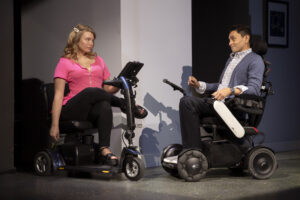By Esme Mazzeo
There’s a scene toward the end of the first act of “All of Me” in which the main character Lucy (Madison Ferris) and her mom Connie (Kyra Sedgwick) both fall while Connie is trying to help Lucy transfer from her scooter to her bed off stage.
The cheap wooden ramp that Lucy used to get over a step between her living area and bedroom had rotted and collapsed, causing the scooter to get stuck, leading to a fall as Connie tries to get Lucy off the scooter.
While lying on the floor, Connie, who has an injured back and self-medicates with wine, begs Lucy (a recent college graduate with muscular dystrophy) to do her exercises, apply for a job at Walmart, and for goodness’ sake, pray to God for help.
“If anyone deserves a miracle, it’s our family,” Connie says from the floor.
Lucy, who prefers to use alternative and augmentative communication (AAC) to talk, indicates to her mother that rather than pray or exercise or think about her future at Walmart —she’d like to lay on the floor in complete silence until her sister Jackie and brother-in-law arrive home from a suspiciously long trip to Dairy Queen to help them up.
It’s one of the saddest moments in the romantic comedy written by Laura Winters and directed by Ashley Brooke Monroe — but also a raw and honest depiction of disabled life.
Such is the magic of “All of Me,” which centers on Lucy and her love interest, Alfonso (Danny J. Gomez), who meet at the hospital after a doctor’s appointment and both use AAC.
Layers of sadness and joy exist in the story between layers of humor and tragedy all while portraying the complexity of the human condition.
Ferris said that after seeing the play, many people often tell her, “I have seen every aspect of my life in this production.”
The core message of the play is that everyone’s life is messy, so thankfully we don’t have to go through it alone.
Gomez and Ferris are proof of this. They’re breaking boundaries together as two disabled actors starring in an off-Broadway play, and Gomez reflected on the effect that sharing the stage has on the production.
“It just gives us a different type of power and command of the stage,” he said, adding that it’s often easy for the audience and actors to forget that the characters are using AAC to speak rather than their bodies.
Ferris said she feels more “comfortable” and less “isolated” with Gomez on stage and crew members who have disabilities helping make the story come to life behind the scenes.
When she meets Alfonso, Lucy is a quick-witted former jazz singer and recent college graduate forced to face the impact her progressive disability is having on her life and the lives of her loved ones, financially and otherwise.
By contrast, Alfonso has an established career and has moved to Schenectady, New York, from Manhattan to start a new job and build a fully accessible home for himself. He and his mother have had decades to acclimate to his life with paralysis and have the money to bypass the red tape involved with needing government assistance.
“All Of Me” explores the nuances of dating, working, and even having sex with a disability while simultaneously reminding the audience that Lucy is also a sister who sometimes makes mistakes and Alfonso is a son trying to temper his mother’s expectations for his life.
“It’s really important that we tell these stories that are closer to real life than what we usually see on TV and movies,” said Gomez, who is making his theatrical debut in the play. “The way that we do it is the way it should be done.”
Alfonso and Lucy’s love story reminds the audience that the mistakes you make when you’re desperate often feel empowering. And acts of love sometimes require great personal sacrifice.
Every scene serves as a reminder that even on the floor in your darkest moment, you can reach out and find a hand to hold.
And it’s a powerful moment for disability representation. Seeing a character like Lucy in a rom-com when she was younger would’ve made her feel jealous of the actor playing the part, Ferris joked. “Growing up, there’s nothing to compare my work to. So it’s both liberating and very isolating.”
“I think people are just so excited and just finally relieved to see themselves in a piece of art,” said Ferris. In an industry only just beginning to acknowledge disabled artists and stories, “All Of Me” sends a clear message to the community — every aspect of your story matters.

